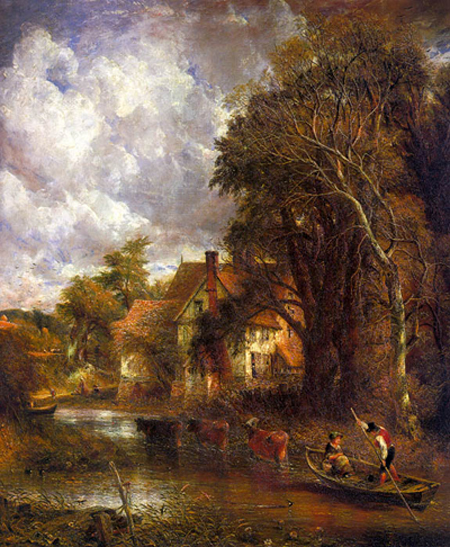
314 Andrews; 472-1806
sbehrendt1@unl.edu
office: 1230-130 MWR,
and by appointment
ENGLISH 4/865: ROMANTICISM
Presession 2001
Stephen C. Behrendt

314 Andrews; 472-1806
sbehrendt1@unl.edu
office:
1230-130 MWR,
and by appointment
Course Information and Objectives
This senior/graduate-level introduction to the
literature and culture of early 19th-century
Britain focuses primarily upon the Romantic period (roughly 1780-1835). Because
of time constraints we will not study prose fiction of the period but will instead
focus on poetry and non-fiction prose. We will consider how the literature and
other cultural artifacts of the Romantic period define, elaborate, interrogate,
or otherwise revisit some of the principal themes, issues, and concerns that
occupied the Romantics. In doing so, we will to some extent also consider some
of the complex relationships that exist between the Romantics (and their culture)
and their predecessors from the later eighteenth century, as well as those that
exist between them and their Victorian successors.
We will approach selected materials in terms
of continuities and discontinuities which we will explore among the themes and
topics we find in them. We will pursue our central preoccupation with the literature,
literary artifacts, and literary community of the Romantic period as a whole
against the broader backdrop of history (social, political, and intellectual),
the arts, economics, and culture generally.
We will be busy.
John Constable. The Valley Farm (1835)
Additional Information: Expectations about Learning
Objectives and Skills
As part of its reorganization of the undergraduate
major in English, the Department has adopted a number of expectations about
the sort of work students can expect to do in courses at the four numbered levels
of the curriculum. In a course at the 400 level (like this one) all students
should expect to do the following:
Graded Course Requirements
Undergraduates:
- class contributions: 50%
- final examination: 50%Graduates:
- class contributions: 40%
- synoptic final essay examination: 30%
- course project: a detailed description of a research project that might arise from your work in this course: 30%
A Note about
Class Contributions
We will be engaging in a variety of activities in this course, and I expect each of you to contribute to making our class meetings "interactive." You will not do much writing; the final examination will be the principal writing assignment. This means that a large portion of your grade will rest on your daily contributions to our classroom discussion.
Please note immediately: no one will earn a grade of "A" who does not participate regularly and actively in dicsussion at a level appropriate for a course at this level.How to aim
at the grade you want for the course:
To get a "C," do the minimum: miss no class meetings, read and prepare assigned readings so you are never at a loss if you are asked a question, but speak only when called upon, contribute "ordinary," plain-vanilla presentations and responses. Earn a grade of "C" or better on the final examination. This is the "bottom line" for getting a "C" in this course.
To get a "B," miss no class meetings, prepare assigned readings thoroughly, initiate discussions about them by asking good questions or suggesting ways to interpret readings, do presentations that reveal that you have done good additional work that you can make both interesting and meaningful to our discussions, and participate actively in those discussions. Earn a grade of "C+" or better on the final examination.
For an "A," take it up
another level: earn a grade of "B" or better on the final examination, miss
no classes, prepare readings thoroughly, find and talk about connections among
them and among other aspects of culture (then and now), take a real leadership
role in class discussions, including working actively to get others involved
in the talk, make your presentations and responses "sparkle" by bringing to
them something really special in terms of your own contributions, interests,
skills, and abilities to think in broad - even interdisciplinary - terms. Most
of all, remember that an "A" indicates the
very best grade a person can get; that should tel l you what sort of
work you need to do to earn the grade.
Comments, Questions, etc.
My door is open to you, and I'll be glad to chat with you. I will maintain the regular office hours noted above, unless an emergency arises, in which case I will post a note. If these times are impossible for you, we can usually make an appointment for some mutually convenient time.Required Course Text
British Literature, 1780-1830, ed. Richard Matlak and Anne K. Mellor